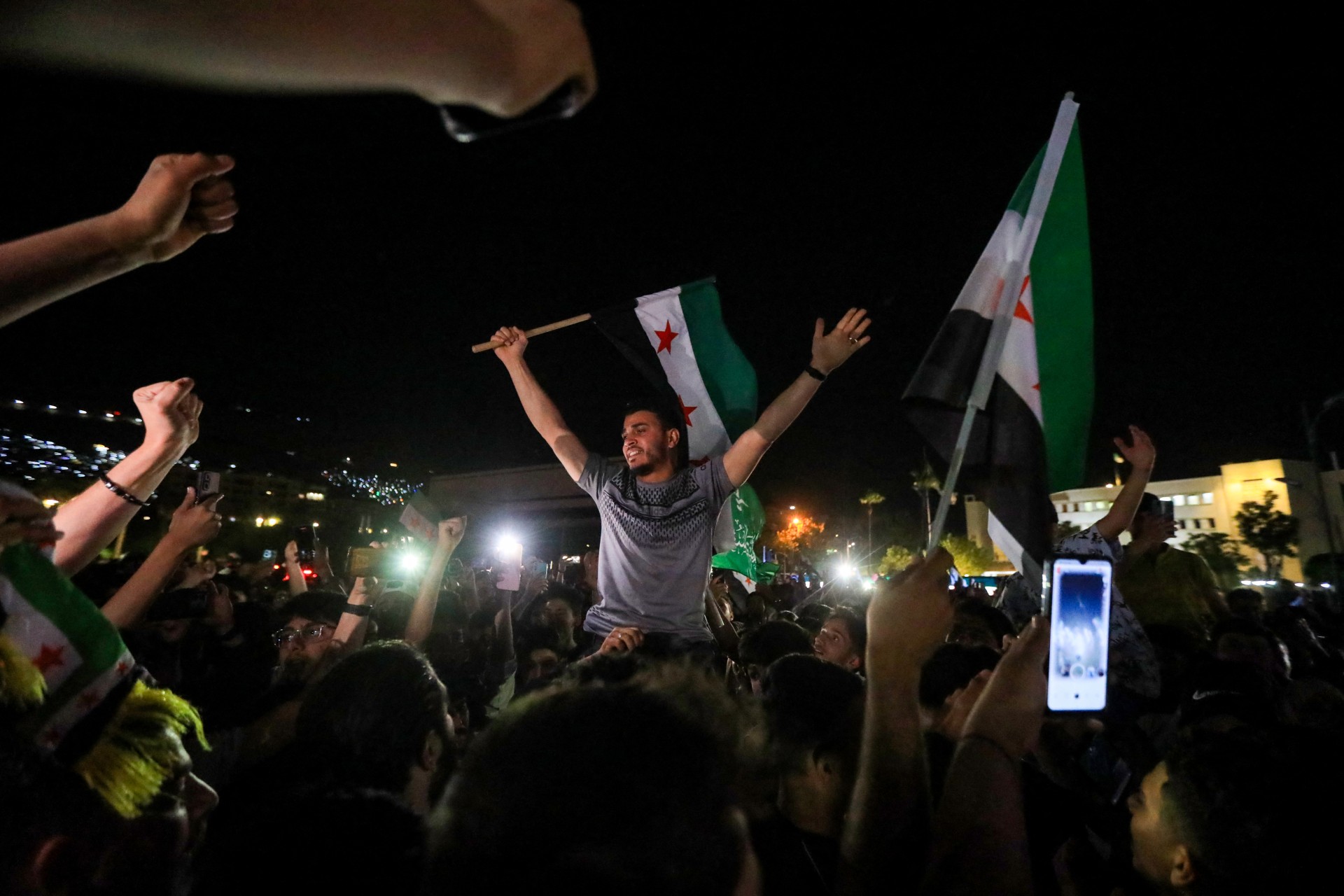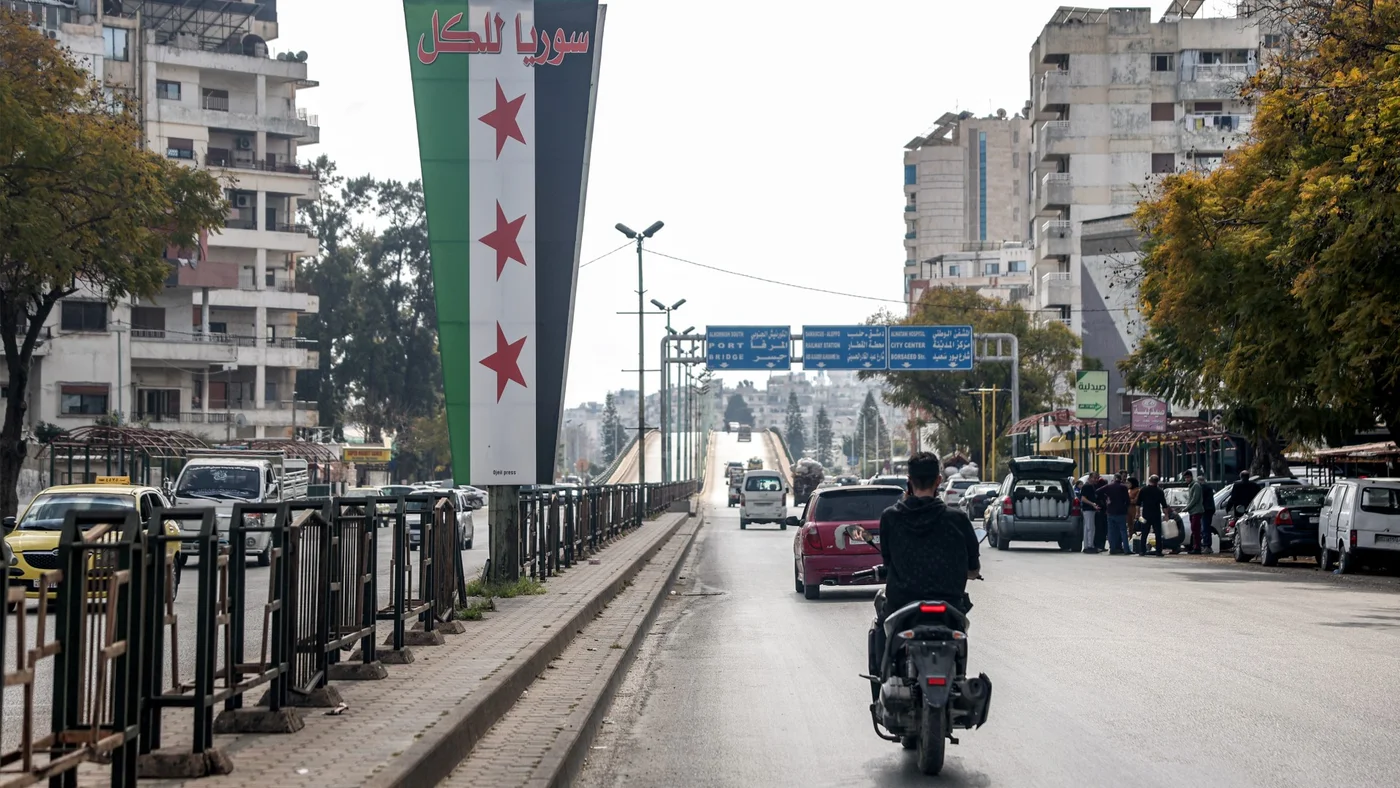Motorists drive past a large sign depicting the new Syrian flag, with a slogan in Arabic reading “Syria for all”, in the western city of Latakia on 9 March 2025 (AFP/Omar Haj Kadour)
Five months after the fall of decades of brutal autocracy, Syrians are celebrating once again.
There were jubilant scenes as President Donald Trump on Tuesday announced the lifting of US sanctions on Syria that had spanned more than 45 years.
“All of my family were out in the streets,” Nedal al-Amari, an activist from Daraa, currently residing in Germany, told Middle East Eye. “There were massive celebrations across all Syrian cities.”
Since the fall of Bashar al-Assad’s government on 8 December, the new Syrian administration led by Ahmed al-Sharaa has struggled to rebuild the war-ravaged economy due to crippling sanctions.
While the European Union and the UK partially lifted restrictions earlier this year, Washington had kept them in place.
In March, the US made a number of demands to Syria’s administration to begin a process of sanctions relief. These included banning Palestinian political activity and unifying the Syrian army – steps that the new Syrian government has taken.
Many had expected a slow process of horse-trading over concessions. But then, during his trip to Saudi Arabia, Trump announced: “I will be ordering the cessation of sanctions against Syria in order to give them a chance at greatness.”
He said that “all” sanctions would be lifted, following lobbying by the Saudi crown prince and the Turkish president.
“I say good luck, Syria. Show us something special,” Trump said.
MEE takes a look at how sanctions compounded the economic devastation of civil war, and what may lie ahead in the coming months.
What sanctions were imposed on Syria?
US sanctions on Syria date back to 1979, when the country was under the rule of Hafez al-Assad.
At the time, Washington designated Syria a “state sponsor of terrorism”, issuing a number of financial restrictions, a ban on US foreign aid and an arms embargo.
Further restrictions were imposed by Ronald Reagan’s administration in 1986, including banning Syrian aircraft from landing in the US.
In 2004, the George W Bush administration accused Syria – by then ruled by Hafez’s son Bashar – of possessing weapons of mass destruction, supporting militant groups in the region (including Hezbollah and Hamas) and destabilising Iraq and Lebanon.
It further limited economic interactions with Syria, banning most exports and freezing the assets of several individuals and entities.
The most extenstive set of global sanctions came after 2011, when the Assad government brutally cracked down on peaceful anti-government protests, sparking a civil war.
In response to war crimes and serious human rights violations, the EU froze the assets of state-linked individuals and banned them from admission to Europe.
It also prohibited the purchase, sale and export of goods in sectors that may be used against civilians, including technology, oil and gas.
The US went further still, banning all trade ties, including the re-export of US goods and services to Syria, with the exception of food and medicine.
In 2019, under the Caesar Syria Civilian Protection Act – named after “Caesar”, a Syrian military defector who smuggled out tens of thousands of photos showing torture and deaths in prisons – secondary sanctions were introduced.
These allowed the US to punish companies in other countries if they engaged in transactions with sanctioned Syrian companies and entities.
The UN did not impose sanctions on the Syrian state, largely due to Chinese and Russian vetoes at the Security Council, but it did designate several groups as “terrorist actors”.
Those included al-Nusra Front, the predecessor to Hayat Tahrir al-Sham (HTS), which would later go on to lead the offensive that toppled Assad in December 2024.
The US, EU, UK and others designated HTS specifically as a terrorist organisation.
Its leader Sharaa – previously known by his nom de guerre Jolani – was added to the list of specially designated terrorists by the US in 2013. A $10m bounty was later added on his head.
How did santions impact the lives of Syrians?
“All areas of life for Syrians were impacted by the sanctions,” Benjamin Feve, an expert on Syria’s political economy, told MEE.
Feve, a senior research analyst at Karam Shaar Advisory, said that contrary to what is often reported, it was not the sanctions themselves that destroyed Syria’s economy.
“The impact of sanctions was mostly that it was preventing the economy from recovering from the war and destruction,” he said.
That included physical destruction to vital areas, such as water or energy infrastructure, which could not be rebuilt.
“The most basic services are non-functional, such as heating, electricity, and transportation,” said Amari.
“This is due to both the Assad regime’s deprivation of the Syrian people and the sanctions that have prevented Syria from importing oil.”
Amari added that health and education had also been severely impacted by the war and sanctions.
Although there were exemptions on humanitarian aid, the breadth of the sanctions meant that Syrians still suffered due to the complexity of complying with the rules.
Most financial institutions refused to deal with Syria at all, fearing secondary sanctions, which disrupted aid operations and made it difficult for Syrians to access basic services.

People celebrate in Damascus’ Umayyad square after US President Donald Trump’s decision to lift sanctions on Syria, on 13 May 2025 (AFP/Bakr al-Kassem)
“Syria was excluded from the international banking system,” Omer Ozkizilcik, a nonresident fellow for the Syria Project at the Atlantic Council, told MEE. “So no investor was able to get his money into Syria and out of Syria by legal and transparent ways.
“Secondly, due to secondary sanctions, many willing nations like the Arab states, Turkey and the European states, who wanted to help Syria to rebuild and who wanted to invest in Syria, were unable to do so.”
As a result of the war and sanctions, over 90 percent of Syria’s 23 million people live in poverty.
The economy shrank 84 percent between 2010 and 2023 according to the World Bank, based on nighttime light emissions (a proxy often used for economic activity where data is incomplete).
The Syrian pound collapsed from 47 to the dollar before the war to a black market rate of 13,000 in early 2025.
What next for the Syrian government?
Since the new Syrian administration under Sharaa took office, it has been unable to make the level of institutional and economic reforms necessary due to sanctions.
“Sanctions prevent the economy from actually functioning properly,” said Feve. “And a government with no money is an impotent government that cannot do anything.”
That includes an inability to rebuild infrastructure, access international finance and import essential goods.
Amari said once sanctions were lifted, the urgent priorities were “providing electricity, oil and gasoline to the population and supplying modern medical equipment”.
He added that job opportunities with adequate salaries must be created, and essential resources given to students at all levels.
The UN estimates that rebuilding Syria will cost $250bn, though analysts said the actual figure was likely to be lower.
“We know from other conflict areas that reconstruction has been done with less money than the United Nations expected,” said Ozkizilcik. “You have to consider the will of the people, [who] are determined to rebuild and reconstruct their country.”
He noted that though the figure may be lower than $250bn, it would still be a huge amount.
“The European nations and the Arab states will be the main sponsors of Syria’s reconstruction,” he said, adding that what was once humanitarian aid would now transition to development assistance.
Feve cautioned that it was still unclear exactly which restrictions were being lifted.
“We don’t know which sanctions are going to be lifted,” he said. “There are many, many sanctions that have been imposed on Syria by the US that are still in place. Some of them date back all the way to 1979.”
One of the areas that remains unclear is the proscription of HTS, which has now been dissolved.
“It could theoretically be argued that there is no longer a presence of HTS as an organisation, and that this terrorism definition is obsolete now,” said Ozkizilcik.
He said the alternative would be for the UN Security Council to agree to delist the group, which may be possible since all members, including Russia and China, have established relations with Sharaa’s government.
Sharaa’s own designation appears obsolete now too, particularly after he shook hands with Trump on Wednesday, who called him a “young, attractive guy” with a “strong past”.
For now, Syrians are hopeful that an economic recovery decades in the making is finally within reach.
“The Syrian people are truly very happy in these moments,” said Amari.














